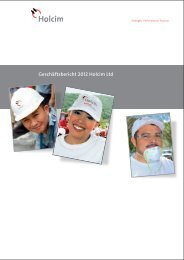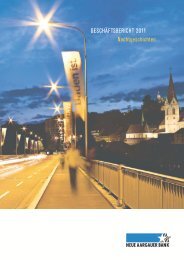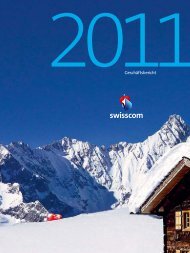Transocean Proxy Statement and 2010 Annual Report
Transocean Proxy Statement and 2010 Annual Report
Transocean Proxy Statement and 2010 Annual Report
Create successful ePaper yourself
Turn your PDF publications into a flip-book with our unique Google optimized e-Paper software.
Ports <strong>and</strong> Waterways Safety Act, the Act to Prevent Pollution from Ships, the Clean Air Act, the Resource Conservation <strong>and</strong> Recovery Act<br />
<strong>and</strong> the Outer Continental Shelf <strong>and</strong> L<strong>and</strong>s Act are not covered by the limitation proceeding. In addition, a number of similar state statutory<br />
environmental claims are not covered by the limitation proceeding.<br />
Pursuant to the Limitation Act, we are seeking an injunction staying certain lawsuits underway in jurisdictions other than the<br />
Eastern District of Louisiana. In addition, we are seeking to limit our liability for personal injury, wrongful death <strong>and</strong> damage to property<br />
contained on the rig to $27 million, the value of the rig <strong>and</strong> its freight, including the accounts receivable <strong>and</strong> accrued accounts receivable,<br />
as of April 28, <strong>2010</strong>. One objective of the filing is to consolidate lawsuits relating to the Deepwater Horizon casualty <strong>and</strong> to process these<br />
lawsuits <strong>and</strong> claims in an orderly fashion, before a single federal judge. The filing also seeks to establish a single fund from which<br />
legitimate claims may be paid.<br />
After the transfer, the presiding judge in the Eastern District of Louisiana issued an order amending the deadline for filing notices<br />
of claims. Pursuant to the amended order, notices of claims must be filed with the court no later than April 20, 2011. A prior order<br />
excluded claims filed under OPA or state OPA analogue statutes enacted to impose liability for the discharge of oil or claims relating to any<br />
removal activities in connection with such a discharge. If a lawsuit is filed under OPA by another party held responsible for the accident,<br />
such as the operator, the action could potentially be included in the limitation proceeding. We expect that the order will be modified in the<br />
future, as necessary <strong>and</strong> appropriate, based on the review <strong>and</strong> assessment of newly filed claims.<br />
On February 18, 2011, we filed a Rule 14(c) tender in the limitation action. As a result of the tender, all defendants will be treated<br />
as direct defendants to the plaintiff’s claims as if the plaintiffs had sued each defendant directly.<br />
The U.S. House of Representatives has passed legislation to repeal retroactively the Limitation Act. We can provide no<br />
assurance of the final form of such legislation, if enacted, or its anticipated impact on us.<br />
Investigations—As a result of the Macondo well incident, the Department of Homel<strong>and</strong> Security <strong>and</strong> the Department of Interior<br />
have announced a joint investigation into the cause or causes of the incident <strong>and</strong> its effects. The U.S. Coast Guard <strong>and</strong> the Bureau of<br />
Ocean Energy Management, Regulation, <strong>and</strong> Enforcement (the “BOE”), formerly the Minerals Management Service, share jurisdiction over<br />
the investigation into the incident <strong>and</strong> we have participated in their hearings related to the incident. In connection with the investigation, we<br />
received subpoenas from the Office of Inspector General of the Department of Interior for certain information. In addition, an investigation<br />
has been commenced by the Chemical Safety Board, the National Academy of Engineering <strong>and</strong> the President of the United States has<br />
established the National Commission on the BP Deepwater Horizon Oil Spill <strong>and</strong> Offshore Drilling (the “National Commission”) to, among<br />
other things, examine the relevant facts <strong>and</strong> circumstances concerning the cause or causes of the Macondo well incident <strong>and</strong> develop<br />
options for guarding against future oil spills associated with offshore drilling. Further, we have participated in hearings related to the<br />
incident before various committees <strong>and</strong> subcommittees of the House of Representatives <strong>and</strong> the Senate of the United States, conferred<br />
with state <strong>and</strong> local government officials, <strong>and</strong> the DOJ has publicly announced that it has opened criminal <strong>and</strong> civil investigations of the<br />
Macondo well incident. We cannot predict the ultimate outcome of these investigations, the total costs to be incurred in completing the<br />
investigations, the potential impact on personnel <strong>and</strong> the effect of implementing measures that may result from these investigations or to<br />
what extent, if any, we could be subject to fines, sanctions or other penalties.<br />
U.S. Department of Justice—On June 28, <strong>2010</strong>, we received a letter from the DOJ asking us to meet with them to discuss our<br />
financial responsibilities in connection with the Macondo well incident <strong>and</strong> requesting that we provide them certain financial <strong>and</strong><br />
organizational information. The letter also requested that we provide the DOJ advance notice of certain corporate actions involving the<br />
transfer of cash or other assets outside the ordinary course of business. We have engaged in discussions with the DOJ <strong>and</strong> have<br />
responded to their document requests, <strong>and</strong> we expect these discussions to continue. In addition, on December 15, <strong>2010</strong>, the DOJ filed a<br />
civil lawsuit against us <strong>and</strong> other unaffiliated defendants. The complaint alleges violations under the Oil Pollution Act of 1990 <strong>and</strong> the<br />
Clean Water Act, <strong>and</strong> the DOJ reserved its rights to amend the complaint to add new claims <strong>and</strong> defendants. The complaint asserts that<br />
all defendants are jointly <strong>and</strong> severally liable for all removal costs <strong>and</strong> damages resulting from the Macondo well incident. In addition to the<br />
civil complaint, the DOJ served us with Civil Investigative Dem<strong>and</strong>s (“CIDs”) on December 8, <strong>2010</strong>. These dem<strong>and</strong>s are part of an<br />
on-going investigation by the DOJ to determine if we made false claims in connection with the operator’s acquisition of the leasehold<br />
interest in the Mississippi Canyon Block 252, Gulf of Mexico <strong>and</strong> drilling operations on Deepwater Horizon.<br />
Drilling moratorium <strong>and</strong> enhanced regulations—On May 30, <strong>2010</strong>, the BOE issued a notice to lessees <strong>and</strong> operators<br />
implementing a six-month moratorium on drilling activities with respect to new wells in water depths greater than 500 feet in the U.S. Gulf<br />
of Mexico. The notice also stated that the BOE would not consider for the six-month moratorium period drilling permits for wells <strong>and</strong><br />
related activities for those water depths. Subsequently, on June 22, <strong>2010</strong>, a United States District Court in the Eastern District of Louisiana<br />
granted a preliminary injunction that effectively lifted the moratorium. On July 12, <strong>2010</strong>, the U.S. Department of the Interior issued a<br />
revised moratorium that was scheduled to end on November 30, <strong>2010</strong> <strong>and</strong> that applied to deepwater drilling configurations <strong>and</strong><br />
technologies rather than specific water depths. On October 12, <strong>2010</strong>, the U.S. government lifted its moratorium. Following the lifting of the<br />
moratorium on October 12, <strong>2010</strong>, operators are required to submit applications in order to obtain drilling permits <strong>and</strong> resume drilling<br />
activities that demonstrate compliance with enhanced regulations, which now require independent third-party inspections, certification of<br />
well design <strong>and</strong> well control equipment <strong>and</strong> emergency response plans in the event of a blowout, among other requirements. We are<br />
working in close consultation with our customers to review the new rules <strong>and</strong> requirements. See “—Outlook—Drilling market.” Although<br />
the moratorium has been lifted, we are unable to predict the impact of the continuing effects of the moratorium <strong>and</strong> the related enhanced<br />
regulations on our operations.<br />
AR-59

















